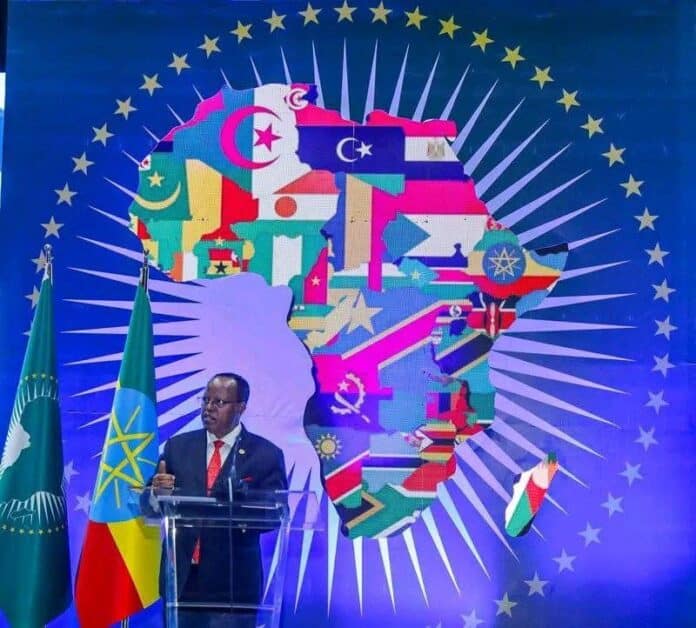During the ongoing African Union (AU) summit in Addis Ababa, an alarming and unacceptable incident occurred: a map of Ethiopia, displayed at the summit, included parts of Eritrean territory. This blatant violation of Eritrea’s sovereignty—an independent and fully recognized AU member state with its delegation present—cannot be dismissed as a mere oversight. Some may attempt to downplay it as an unfortunate mistake, but for Eritreans, it is neither trivial nor accidental.
This is not the first time such actions have taken place. Rather than an isolated occurrence, it reflects a troubling and persistent mind-set among certain Ethiopian circles—including within the government—that have yet to fully accept Eritrea’s independence. Nearly 35 years after Eritrea’s hard-fought liberation, incidents like these serve as stark reminders that some factions in Ethiopia still struggle to acknowledge that Eritrea is a sovereign nation, here to stay.
This is not just about an inaccurate map; it is part of a deeper pattern of historical denialism. Despite the legally binding Algiers Agreement of 2000, which settled the border dispute, and the 2018 peace agreement, which aimed to normalize relations, Ethiopia continues to engage in symbolic and political acts that undermine Eritrea’s territorial integrity. Of particular concern is Ethiopia’s increasingly vocal rhetoric on acquiring a seaport, framed as an existential necessity. The fact that the map in question incorporated Eritrean coastal areas raises serious doubts that this was an innocent oversight. Instead, it suggests a deliberate attempt to normalize claims over Eritrean territory.
As Africa’s premier diplomatic institution, the AU has a duty to uphold the sovereignty and territorial integrity of all its member states. While Ethiopia serves as the host nation, this should not translate into undue influence over AU affairs, nor should it allow for repeated violations of diplomatic norms. The AU must ensure that its platform is not misused to promote revisionist narratives or undermine the independence of any of its members. If left unchallenged, this incident sets a dangerous precedent, emboldening similar actions in the future—not just against Eritrea, but against any nation facing territorial claims. The credibility of the AU itself is at stake, and it must take a firm stance against such breaches of diplomatic protocol.
The Eritrean delegation attending the summit must not allow this incident to pass unnoticed. Immediate diplomatic steps should be taken, including a formal request for clarification from both the Ethiopian government and the AU Commission on how such an incident occurred. A strong and public statement must be issued, calling for accountability and ensuring that similar actions are never repeated. Moreover, Eritrean officials must actively engage other AU member states to make them fully aware of this violation and seek their support in condemning it. Silence would not only signal weakness but invite further provocations in the future.
Eritrea’s sovereignty is not up for debate, negotiation, or political manipulation. Any attempt—whether overt or subtle—to challenge its independence will be met with firm and unwavering resistance. If Ethiopia is truly committed to peace and stability, it must take responsible steps to ensure that such incidents do not recur. At the same time, the AU must address this matter with the seriousness it deserves, ensuring that all member states receive the respect and recognition they are due.
Eritrea’s long struggle for independence was neither easy nor uncertain, and its sovereignty remains non-negotiable. Any attempt to undermine it—whether through political rhetoric, diplomatic maneuvers, or symbolic gestures—will only strengthen Eritrea’s resolve. The world must take note: Eritrea is not merely defending its borders but reaffirming a historical truth that cannot be rewritten. Those who seek to challenge this reality would do well to remember that Eritrea’s independence is permanent, and its people will never accept anything less than full and unquestioned recognition of their nation’s rightful place in the world.


why cant we share the port?